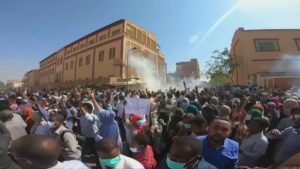The protests in Sudan have entered their sixth week. Instead of fading into oblivion under the weight of President Al-Bashir’s iron-fisted response, they have gathered momentum, evolving into a countrywide social change movement. The protests began in several cities on the outskirts of Khartoum in response to the elimination of a bread subsidy, that caused the cost of food to skyrocket. It seems this was the proverbial last straw for a war-beleaguered and disenfranchised populace fed up with Al-Bashir’s 30 year genocide and mass atrocity-tainted reign of terror. The slogan uniting the nationwide protests: “Bashir must fall.”
Though protests have flared up before, quickly extinguished by the government’s excessive and criminal use of force, the persistence, scope, and cohesiveness of these demonstrations distinguish them from all that came before. The people have had enough of Khartoum’s divisive tactics of inciting ethnic tensions to keep the country in a perpetual state of unrest and insecurity. Sudanese across the expansive nation have united in a remarkable showing of solidarity. The sheer size of the crowds that have created a kind of protective armor for demonstrators, prompting people to come out in droves again and again, despite bullets whizzing by and teargas clouding their eyes. The arrest and arbitrary detention of hundreds, maybe thousands, has not deterred them.
In fact, the more the regime retaliates, the more galvanized the masses become. Each new protester death prompts larger demonstrations of solidarity and resilience. Perhaps that’s why violence against civilians – though profane, as always – remains proportionately low, given that the protests have spread to every major city in every major region, including traditional pro-regime strongholds.
The people are emboldened like never before. Largely due to the impressive coordination efforts of civil society organizations and the Sudanese Professionals Association (SPA), the movement continues to gain momentum and sophistication. When the SPA was disparaged by a government official last week as being incapable of staging two simultaneous protests, the people rose to the challenge, quickly mobilizing to hold more than 50 marches on the same day, Jan. 24.
After three decades of successfully exploiting Sudan’s ethnic and racial divides between ethnic Arabs who live along the Nile River and ethnic Africans living in the Darfur region, a new generation is onto his manipulations and is hoping their adamantine unity will pave the way to his demise. “It just does not work anymore,” said Osman Ahmad, one of the young protesters on the streets of Khartoum interviewed by the Washington Post’s Max Bearak. “They may have successfully divided us in the past, and it worked on our parents and grandparents. But it’s not working on us, the new generation. We are onto them.”
So, when Al-Bashir attempted to skewer a group of innocent Darfuri university students as a bloodthirsty terrorist cell planning to target demonstrators, the people called his bluff. Instead of succumbing to the regime’s usual strategy of seeding fear and fomenting divisions along myriad lines – religious, ethnic, economic – the people recognized the blatant racist ploy and chanted, “We are all Darfur!”
This has long been the mantra of Jewish World Watch, which has stood with the people of Darfur for fifteen years, honoring our shared humanity. Now it is the international community’s turn to do the same. We cannot turn our backs on this rare, singular opportunity for real change. There is no going back. So, Washington can either sit idly by while Sudan self-destructs or play a formative role in the realization of democracy in a country of immense geostrategic importance. As adroitly summarized by Just Security, “Reluctance to support a nonviolent, gradual, civilian-led transition in Sudan now risks not only missing a rare opportunity for peaceful change, but also passively facilitating a dangerously insecure Sudan and the potential for calamitous state failure in a critical region.”
First and foremost, the Trump Administration’s normalization efforts with Al-Bashir’s genocidal regime must promptly cease. Started under the Obama Administration, the process to restore diplomatic relations with Sudan resulted in a lifting of a twenty-year trade embargo and government asset freezes in Oct. 2017. More recently, negotiations have been underway to remove Sudan’s designation as a state sponsor of terror (SST). Inclusion on the SST list impedes new investment and precludes Washington from supporting debt relief, which Sudan needs more than ever in the face of unprecedented corruption-induced economic strife.
To continue these normalization efforts in the face of such sustained, cohesive, and nonviolent calls for change would be completely antithetical to the very fabric of America. The egregious violations of Al-Bashir’s regime against the Sudanese peoples are numerous and astounding: genocide against the people of Darfur; deprivation of vital humanitarian assistance; bombing and starvation in the Nuba Mountains and Jebel Marra; targeting of minorities. Not to mention that he has played the United States multiple times–offering assistance in the war on terror while harboring terrorists and cozying up to others on the state sponsor blacklist.
Last week, Robert Palladino, Deputy Spokesperson for the State Department expressed Washington’s support for the Sudanese people, condemned the excessive use of force by Sudanese security forces, and warned Al-Bashir that “a new, more positive relationship between the United States and Sudan requires meaningful political reform and clear, sustained progress on respect for human rights.” Using normalization as a carrot will no longer do. It is an insufficient response to what is happening in Sudan right now. The United States must categorically call for Al-Bashir’s resignation and provide support for a democratic transition.
Please join Jewish World Watch in calling upon Secretary of State Mike Pompeo, President Donald Trump, Chair of the House Subcommittee on Africa, Global Health, Global Human Rights, and International Organizations Rep. Karen Bass, and the Ranking Member of the Senate Subcommittee on Africa and Global Health Sen. Corey Booker, to cease normalization negotiations and call for the resignation of President Omar Al-Bashir.


